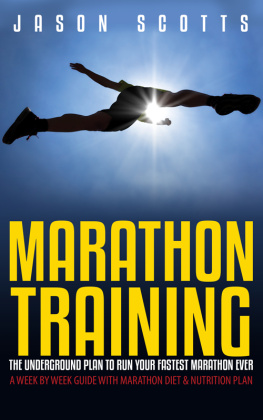Thank you for downloading this Gallery Books eBook.
Join our mailing list and get updates on new releases, deals, bonus content and other great books from Gallery Books and Simon & Schuster.
C LICK H ERE T O S IGN U P
or visit us online to sign up at
eBookNews.SimonandSchuster.com
We hope you enjoyed reading this Gallery Books eBook.
Join our mailing list and get updates on new releases, deals, bonus content and other great books from Gallery Books and Simon & Schuster.
C LICK H ERE T O S IGN U P
or visit us online to sign up at
eBookNews.SimonandSchuster.com
For my beautiful wife, Louise
You have the most generous heart and the most caring soul. Thank you for inspiring me every day. I love you.
CONTENTS
INTRODUCTION
IF YOU ARE GOING THROUGH HELL, KEEP GOING. WINSTON S. CHURCHILL
My career as a mental trainer officially started a decade ago, but the seed was planted much earlier, when I was a nineteen-year-old student in the Norwegian Officer Candidate School for the Cavalry. The fact that Id been admitted to the school at all was somewhat of a miracle, since growing up I wasnt exactly what youd call army material. Just the opposite: I was the scrawny kid who got pushed around a lot on the playground and had trouble connecting with his peers.
Fortunately, I had a family who loved and supported me, which meant that I still developed a sense of self-esteem even though I was scrawny. Eventually I also developed physically, but what impressed Norways military recruiters was my internal qualitiesmy attitude. I was even being considered for the Recon unit, the most sought after at the school (and a precursor to my becoming a paratrooper two years later with the Norwegian special forces, trained to operate deep behind enemy lines, much like the United States Special Forces Airborne units).
So there I was, seated in a classroom for my first lecture on wilderness survival. This is an essential skill for any military personnel, but especially for Recons, given the risky nature of their missions. They often find themselves in situations where theyre forced to fend for themselvessay, if an operation goes awry or if they escape enemy capture and need to find their way back to the unit without the benefit of navigation aids.
I looked around at the other students in the class, all of whom seemed even stronger and more confident than I had become as a young man, and I wondered if Id bitten off more than I could chew.
Thats when the officer at the head of the class took a piece of chalk and drew a vertical line on an empty blackboard. He then plotted the numbers zero through ten along the line in ascending order, zero at the bottom and ten on top.
He pointed to the number four and said, This is how much you think you can take. Then he pointed to the number two and said, Your mother probably thinks you can take only this much. He moved his index finger gradually up to seven. The officers in this room know you can take a lot more. He looked at us sternly.
But heres the reality. You can take even more than they think. His index finger stopped at ten. Most importantly, you can take a lot more than you think.
You can take a lot more than you think.
Those words stuck with me that day, as my fellow soldiers and I moved from the classroom to the mess hall to the barracks. Lying in bed that night, I pondered the simplicity of the officers statement, but also its enormity. It seemed to contain one of the great secrets of life.
The next morning, I was up before dawn with the rest of my unit, eager to swiftly move up the vertical axis. I pushed myself to the furthest edge of my limits during that survival training. Never before had I walked such long distances without food in my stomach, or swam so much in freezing cold waters. Never before had I navigated solely by the position of the stars or built a fire using only sticks and the hemp from a section of rope.
With each new accomplishment, more of my best was revealed. I realized that just as the officer had predicted, I could take on much more than I ever thought possible. That revelation, which started with the officers words and played out over the course of my survival training, changed my life foreverand it would ultimately lead to my career as a mental trainer.
First, though, I had to fulfill my military duty, serving as a leader in the long-range reconnaissance and paratrooper units. That is, until my career and nearly my life were cut short by an automobile accident (but well get to that later). I came back, though, and my military experience took me to Afghanistan, Kosovo, Bosnia, Macedonia, and many other missions for the military in between. I trained and fought alongside the British Special Air Service. These formative years opened my eyes to the valueshard work, decisiveness, characterthat I hold dear, both as an individual and as a mental trainer.
After retiring from the military, I needed a different kind of challenge, so I decided to enter the world of businesswhich of course has its own kind of battlefields and war zones. Armed with a masters degree from the Norwegian School of Economics and Business Administration, I worked in finance and for a company that specialized in recruitment and management development.
It was during that stage of my career that I witnessed firsthand the career frustrations that so many people experience on a daily basis. More often than not, it was obvious that they were holding themselves back, not anyone else. Whats more, they seemed to understand this. There was the corporate manager who knew that he needed to be more structured with his job. He knew he had to plan more efficiently for meetings with his staff, to articulate ideas more clearly to clients, and to impress his own superiors with a more convincing semblance of order or control. With all those shortcomings, its a wonder he managed to hold on to his jobthough corporations often tolerate mediocrity, at least until it catches up with them and the whole operation comes crashing down.
I met many people in similar situations during those early years in the business world. Ive always hung around athletes, and I started to become aware of the same thing there, even at the highest levels, where youd expect more discipline and commitment. Instead of sticking to a healthy diet, these guys would cheat with pizza or burgers and fries. Instead of getting that much-needed nap in the afternoon, theyd spend the time surfing the Internet. Just like the middling corporate manager, the underachieving athletes I mixed with recognized the error of their ways. They just couldnt break away from the bad habits. Even when they had the know-how and the resources to do better, they chose the path of least resistance.
Then there were the exceptions, the winners and the overachievers and the leaders of their fields. Perhaps owing to the fact that I was a pretty late bloomer in life, Ive always been curious about these people. How do they differ from the rest of us? Where do they find the resolve to plan for every meeting or competition and resist every temptation? Why do they win, exactly?
I began to work on these questions more systematically. I found that the distinctions between the winners and the rest of us are surprisingly small . Those who perform at the highest level have one thing in common: they pay attention to detail. They develop exceptional habits, where others settle for the norm. They are better at making more of the small, positive decisions in their everyday life. The sum of all of these choices may not make a difference on a daily basis, but over timeweeks, months, yearsthe effect is enormous. Since this practice has nothing to do with being born with the right skills, everybody has this opportunity dormant within them. It isnt a question of talent. Its a question of choice.
Next page






